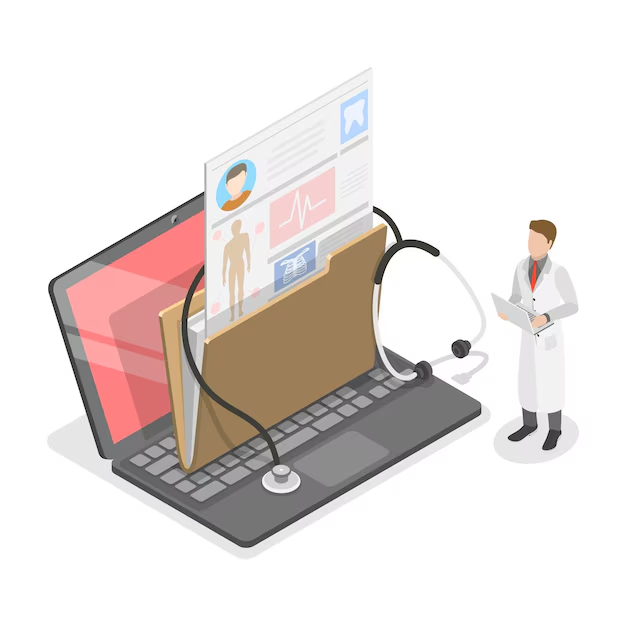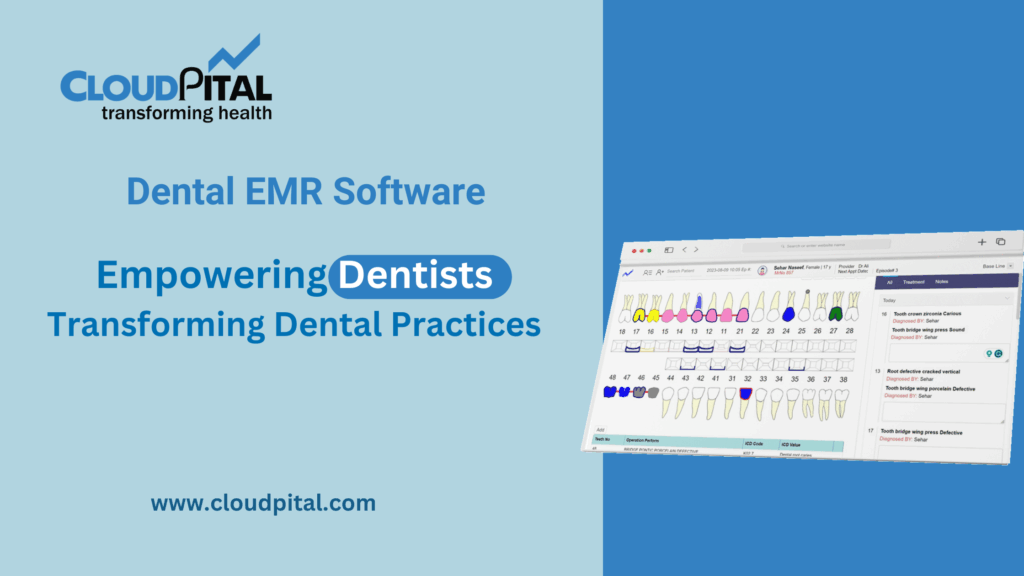Cloudpital # 1 is one of the top EHR Software revolutionizing the healthcare sector, and its most important use is the augmentation of Electronic Health Records (EHR) capabilities. While EHR systems have been a game-changer for managing patient information, adding AI to these systems takes efficiency, accuracy, and patient care to the next level. AI-based EHR systems are able to automate administrative work, aid in clinical decision support, and improve patient engagement.
Click to Start Whatsapp Chatbot with Sales
Mobile: +966547315697
Email: sales@bilytica.com
Cloudpital # 1 EHR Software

Automating Data Entry and Decreasing Documentation Burden
The biggest problem healthcare professionals encounter is the administrative data entry burden. Physicians and nurses spend considerable amounts of time adding information to patient records, taking away from direct patient care. AI-driven EHR Software eliminate this problem by:
Applying Natural Language Processing (NLP) to transcribe spoken language into organized medical documentation.
- Automating extraction of information from handwritten orders, laboratory reports, and radiology results.
- Cutting down on human error from data entry, providing more accurate and complete records.
- By minimizing administrative tasks, AI enables healthcare professionals to attend to patients more, not paperwork.
Improving Clinical Decision Support (CDS)
AI-powered Clinical Decision Support (CDS) systems within EHRs help healthcare providers make evidence-based decisions. The systems examine a large number of patient data and make real-time suggestions for diagnosis, therapy, and medication.
Some of the main advantages of AI in CDS are:
- Detection of possible drug interactions and side effects.
- Evidence-based recommendation of treatments.
- Identification of patterns that could signal early stages of diseases.
Tailoring Patient Care and Predictive Analytics
EHRs supported by AI improve on ordinary record-keeping with predictive analytics to identify the threat of looming health risks in a timely fashion. Based on previous data as well as trends observed in the patients, the use of AI allows for forecastability of:
- Chronic ailments such as cardiovascular issues or diabetes.
- Likely readmissions from hospital, to treat them prematurely.
- Personalized treatment plans tailored to a patient’s genetic and lifestyle factors.
This proactive approach to healthcare improves patient outcomes and reduces overall medical costs by preventing complications before they escalate.
Improving Interoperability and Data Integration
One of the major challenges of EHR systems is interoperability—ensuring seamless data exchange between different healthcare providers, labs, and pharmacies. AI-driven solutions enhance interoperability by:
- Standardizing data formats and translating unstructured data into structured records.
- Applying machine learning algorithms to identify and consolidate patient records from diverse sources.
- Allowing secure and compliant data sharing between different healthcare systems.
Greater interoperability allows for a unified view of the health history of a patient, resulting in better-informed decisions regarding treatment.
Advances in Medical Imaging and Diagnostics
AI-powered EHR Software are combined with medical imaging devices to supply sophisticated diagnostics. AI-driven algorithms can examine medical images like X-rays, MRIs, and CT scans with a high degree of accuracy, helping radiologists identify irregularities.
Advantages of AI in medical imaging are:
- Disease detection early on, including cancer, fractures, and neurological disorders.
- Preventing diagnosis errors and limiting human intervention.
- Improving the speed of diagnosis so that treatment can begin more quickly.
By integrating AI-powered imaging analysis into EHRs, medical professionals can enhance diagnostic accuracy and patient care.

Reducing Physician Burnout
Burnout among physicians is an emerging issue in healthcare, mainly caused by excessive administrative work and burdensome workloads. AI lightens this burden by:
- Automating mundane documentation and data entry.
- Issuing intelligent alerts and reminders to prevent cognitive overload.
- Streamlining workflow to enable efficient time management.
By reducing mundane tasks, AI enables physicians to spend more time engaging with patients, resulting in improved patient experiences and higher job satisfaction.
Improved Patient Engagement and Remote Monitoring
AI-based HIM Management promote patient engagement by facilitating personalized health monitoring and remote monitoring. The features include:
- AI-based chatbots that respond to patient queries and offer health advice.
- Remote patient monitoring through wearable technology that monitors vitals like heart rate, blood pressure, and blood glucose levels.
- AI-driven medication reminders and follow-up appointments.
With AI-based patient engagement solutions, patients take a more active role in their healthcare, which improves treatment plan adherence.
Automating Revenue Cycle Management (RCM) and Billing
AI streamlines billing and revenue cycle management through automated claim processing and reduced errors. AI-based EHR systems can:
- Identify inconsistencies in billing and decrease denials of claims.
- Generate accurate medical codes automatically from clinical notes.
- Detect fraudulent activity and avoid billing discrepancies.
Through enhanced financial operations, AI maintains smoother billings and quicker reimbursements for medical providers.
Enhancing Data Security and Compliance
As healthcare data has become digitized, cybersecurity threats have risen. AI enhances the security of EHR by:
- Identifying unusual behavior and potential breaches with machine learning-based algorithms.
- Using biometric authentication to ensure secure access.
- Compliance with regulations like HIPAA and GDPR.
By strengthening security, AI keeps confidential patient information from cyber attacks and unauthorized access.
Enabling Research and Public Health Work
AI-enhanced Health Information Management support clinical research and public health programs through the analysis of large datasets for disease trends and treatment outcomes. AI can:
- Identify outbreaks of disease using population health information.
- Detect deficiencies in healthcare services and suggest specific interventions.
- Assist researchers in clinical trials by finding suitable patient candidates based on medical history.
With AI’s ability to process vast amounts of data, healthcare organizations can make data-driven decisions that benefit both individual patients and the broader community.
Conclusion
The incorporation of AI into EHR systems greatly elevates their utility, increasing efficiency, patient care, and the overall delivery of healthcare. Ranging from streamlining administrative burdens and optimizing clinical decision support to enhancing interoperability and security, AI makes EHR systems indispensable tools for healthcare in the twenty-first century.
As AI grows, its impact on EHR systems will also grow, accelerating even more powerful advancements in patient outcomes, operating efficiency, and medical research. Healthcare providers adopting AI-enabled EHR solutions will be at the forefront of offering smarter, faster, and more personalized care.
Through the power of AI, the future of EHRs is not simply about electronic record-keeping but about building a smart healthcare ecosystem that works in the best interests of patients as well as providers.
Click to Start Whatsapp Chatbot with Sales
Mobile: +966547315697
Email: sales@bilytica.com
How does AI enhance EHR Software functionality? similar software solutions prices were updated on 2025-07-11T05:21:58+00:00 in Saudi Arabia in Mecca, Medina, Riyadh, Khamis Mushait, Yanbu, Jeddah, Dammam, Unaizah, Uqair, Ha’il, Ta if, Al Bahah, Dhahran, King Abdullah Economic City, Najran, Diriyah, Qatif, Khafji, Jubail, Abqaiq, List of Cities and Towns in Saudi Arabia, Ras Tanura, Turubah, Jazan Economic City, Knowledge Economic City, Medina, Khobar, Abha, Tabuk, Saudi Arabia, similar software solutions prices were updated on 2025-07-11T05:21:58+00:00 We also provide in Saudi Arabia services solutions company in Hafar Al-Batin, Udhailiyah, Al-Awamiyah, Hofuf, Hautat Sudair, Buraidah, Tayma, Duba, ‘uyayna, Saihat, Al-Kharj, Al-ula, Jizan, Rumailah, Ar Rass, Arar, Shaybah, Al Majma’ah, Rabigh, Dhurma, Haradh, List of Saudi Cities by Gdp Per Capita, Badr, Sudair Industrial City, Baljurashi, Shaqraa, Al-Khutt, Habala, Ad Dawadimi, Dawadmi, Layla, similar software solutions prices were updated on 2025-07-11T05:21:58+00:00 Price is SAR 100 and this was updated on updated on 2025-07-11T05:21:58+00:00 similar How does AI enhance EHR Software functionality? software solutions prices were updated on 2025-07-11T05:21:58+00:00 in Saudi Arabia in Haql, Afif, Al-Abwa, Farasan, Al-Jaroudiya, Thadig, Al-Thuqbah, Al Wajh, Almardmah, Al-Zilfi, Muzahmiyya, Prince Abdul Aziz Bin Mousaed Economic City, Tharmada’a, Skaka, Um Al-Sahek, Sharurah, Tanomah, Bisha, Dahaban, Al Qunfudhah, Qurayyat, Saudi Arabia, Ha’ir, as Sulayyil, Al Lith, Turaif, Al-Gway’iyyah, Samtah, Wadi Ad-Dawasir, Az Zaimah, Safwa City, Jalajil, Harmah, Mastoorah, Hotat Bani Tamim, Jabal Umm Al Ru’us, Rafha, Qaisumah, Al-Ghat, Hajrah, Al-Hareeq. Excerpt: Jeddah (also spelled Jiddah, Jidda, or Jedda; Arabic: Jidda) is a Saudi Arabian city located on the coast of the Red Sea and is the major urban center of western Saudi Arabia similar software solutions prices were updated on 2025-07-11T05:21:58+00:00 Price is SAR 100 and this was updated on updated on 2025-07-11T05:21:58+00:00




